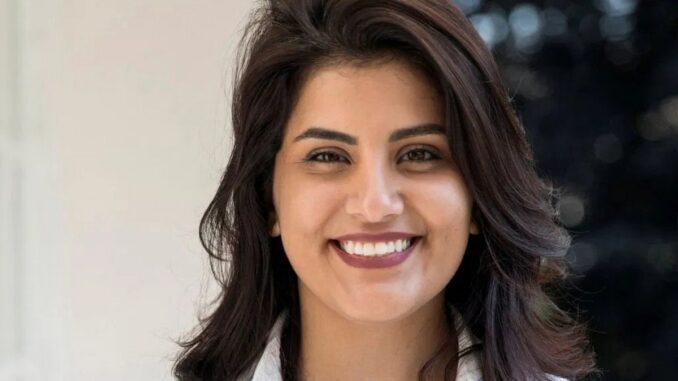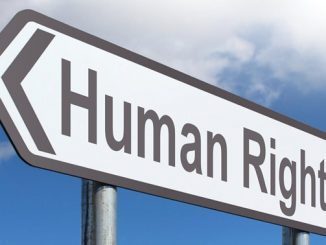
After more than 1,000 days in detention where she endured torture and hunger strikes, Saudi women’s rights activist Loujain al-Hathloul released Wednesday 10th of February, 2021.
A Saudi court sentenced Hathloul to close to six years in prison late in 2020 on charges of contacting foreign organisations stemming from her human rights work. With time served and the court suspending part of the jail sentence, she was set for release in March.
Her early release would come weeks into the administration of US President Joe Biden, who has vowed to “reassess” relations with Riyadh and prioritise human rights in its dealings with the kingdom.
Her sister Lina published a photo of a smiling Loujain on Twitter early evening Riyadh time – the first image of the most celebrated political prisoner in the Kingdom since she was detained almost three years ago. “Loujain is at home !!!!!!”, the accompanying message said.
In a phone call with Saudi Foreign Minister Faisal bin Farhan last week, US Secretary of State Tony Blinken stressed “several key priorities of the new administration including elevating human rights issues and ending the war in Yemen”, according to a statement by the State Department.
On her comment on this call, said Sarah Leah Whitson, the well known international human rights activist; On the heels of release of #LoujainAlhathloul this phone call happens but an appeasement strategy is what got us #Yemen into war in 1st place. US has NO business defending unelected monarchs who abuse their citizens&peoples abroad. This is harming not defending Saudi people.
Hathloul, a women’s rights defended, had been engaged in public campaigns to allow women to drive.
Under the leadership of Crown Prince Mohammed bin Salman, the kingdom lifted the driving ban on women but arrested Hathloul and others who lobbied for that right.
Hathloul was first kidnapped in 2018 in the United Arab Emirates, where she lived, and flown into Saudi Arabia against her will, where she faced a trial based on a loosely worded terror law often used to prosecute activists.
She quickly became an international icon symbolising the crackdown on individual and political freedoms in Saudi Arabia.
In 2019, Hathloul and fellow detained feminist activists Nouf Abdulaziz and Eman al-Nafjan received the PEN/Barbey Freedom to Write Award that is given to prominent advocates of freedom of expression.
According to rights groups and family members, Hathloul faced sexual harassment and was tortured with the direct involvement of Saud al-Qahtani, a top aide to bin Salman.
Monday marked 1,000 days for Hathloul in jail. Human rights groups and women’s rights activists had paid tribute for the jailed activist throughout the day.
“Today marks the 1,000th day that Saudi writer-activist Loujain Al-Hathloul has spent in prison for her work speaking up for women’s rights,” Pen America said in a tweet.
“She now serves a nearly six-year prison sentence. We must continue calls to #FreeLoujain unconditionally and defend the #FreedomToWrite.”
The Biden administration, which had not taken office, had decried the sentence against Hathloul in December.
“Saudi Arabia’s sentencing of Loujain al-Hathloul for simply exercising her universal rights is unjust and troubling,” National Security Adviser Jake Sullivan said at the time.
“As we have said, the Biden-Harris administration will stand up against human rights violations wherever they occur.”
Saudi officials, however, have argued that the cases of Hathloul and other activists are a judicial, not a political issue.
“They are not detained because of any human rights activity or activities related to women’s emancipation. They are charged with serious crimes under our laws and everyone is equal under the law in the Kingdom of Saudi Arabia,” bin Farhan, the foreign minister, said, when asked about Hathloul and other women rights defenders last October.
Seth Binder, advocacy officer at the Project on Middle East Democracy (POMED), told MEE that the Biden administration’s approach to human rights in the kingdom is a “dramatic change” from its predecessor.
Binder said that Hathloul’s expected release is a “nice, positive” development. “But unless her release is unconditional, and she’s not put on a travel ban or any other step that restricts her freedoms, then it’s only a partial victory and not done.”
Sarah Leah Whitson, the executive director of Democracy for the Arab World Now (DAWN), said news of Hathloul’s expected release shows that the administration of former President Donald Trump, including ex-Secretary of State Mike Pompeo and top adviser Jared Kushner, did not push adequately to free the activist.
Whitson also warned that freeing Hathloul cannot be seen as a sign of reform in the kingdom, while many other dissidents remain detained.
“Great news and clear evidence that tireless activity works. Many #Saudi political activists remain in jail, and we will not rest until every last one is released,” she wrote on Twitter.



